
Favorites List --- The Adventures Of Tom Sawyer --- Part One
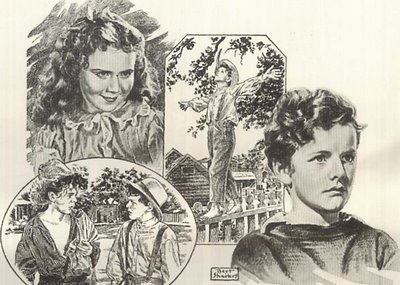
Just back from Myrtle Beach, SC, where I was reminded of years back travel with a church youth group. As others of the party cruised arcades, or worse, tried scoring illicit cigarettes or beer, I spent a first afternoon closeted within the Rivoli Theatre watching (twice) David O. Selznick’s The Adventures Of Tom Sawyer. Summer 1970 came short of a 1973 Sawyer remake that would star Family Affair’s Johnny Whitaker as Tom, this to supplant the 1938 version in theatres. I sat and marveled at a 30's Technicolor feature playing a big screen after what at the time was thirty-two years. How could peers waste their afternoon at shore swims or miniature golf when they could be watching this? The cave sequence, with Tom and Becky Thatcher's flight from Injun Joe had been stuff of wonder even on television. Now I sat and cried when Tom climbed rocks to a sunlit opening, return then to rescue Becky. I still put it among most dynamic scenes in movies. The 1938 Tom Sawyer seemed to be everywhere during the sixties. In addition to re-issues, there were frequent runs on local television. Our Channel 8 from High Point would alternate the Selznick with Paramount’s early talking 1930 version featuring Jackie Coogan as Tom. Here were vintage titles we had dependable access to, a thing not to be taken for granted. I wouldn’t realize until later what a troubled production The Adventures Of Tom Sawyer was, and how misused it has been since initial 30's release.
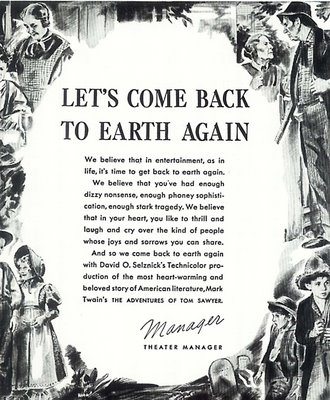
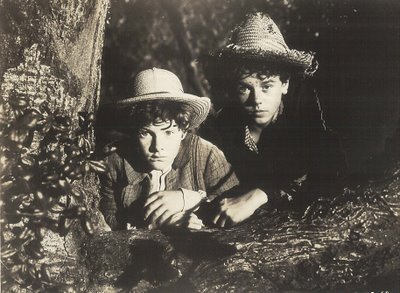
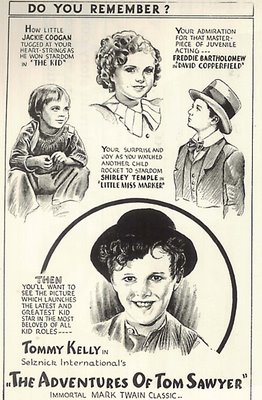 There were several false starts. Selznick had to begin with black-and-white in March of 1937 when Technicolor units proved unavailable. The process was gaining ground with the studios, but limited equipment and resources were booked far ahead. Tom Sawyer’s initial director was H.C. Potter, who remained through one production shutdown (during April and May), but eventually quit as a result of Selznick’s ceaseless interference (a fact of life for all helmsmen at this company). Filming in B/W had resumed by June, to be interrupted again when Technicolor suddenly became available in July. Several cast members were replaced (Beulah Bondi out as Aunt Polly, May Robson in), but Selznick’s pick for the title role stood. Tommy Kelly was the non-professional son of an unemployed Bronx fireman (what … so they weren’t having fires anymore in the Bronx?). The twelve-year-old was paid a hundred dollars a week, his father handed a studio police job on the Selznick-International lot. The producer had hoped to draft his young players from orphan asylums (!), so as to arouse such a warm public feeling that it would add enormously to the gross of the picture (his memo), but eventually resorted to a cast of pro moppets, Tommy Kelly excepted. Everyone who had a contract with Selznick was expected to pitch in. Seasoned scribe Ben Hecht contributed draft revisions as he was completing Nothing Sacred, while George Cukor directed portions of the schoolhouse and pirate island segments. By now, Norman Taurog had been brought on as principal director, having had experience with children on previous jobs. Test runs of the completed Tom Sawyer unnerved youngsters in attendance, and mothers complained. Seems the cave content was too intense, particularly a swarm of bats resulting in Becky’s fit of hysteria. Selznick snipped an unusually horrible close-up of Becky laughing hysterically and in which her mind is obviously completely gone. He went on to observe that she looks like a little witch instead of a little girl. Though the bat attack was among his favorite scenes in the picture, the producer also had it shortened. Two days of retakes were ordered under William Wellman’s direction in December for a planned February 1938 opening.
There were several false starts. Selznick had to begin with black-and-white in March of 1937 when Technicolor units proved unavailable. The process was gaining ground with the studios, but limited equipment and resources were booked far ahead. Tom Sawyer’s initial director was H.C. Potter, who remained through one production shutdown (during April and May), but eventually quit as a result of Selznick’s ceaseless interference (a fact of life for all helmsmen at this company). Filming in B/W had resumed by June, to be interrupted again when Technicolor suddenly became available in July. Several cast members were replaced (Beulah Bondi out as Aunt Polly, May Robson in), but Selznick’s pick for the title role stood. Tommy Kelly was the non-professional son of an unemployed Bronx fireman (what … so they weren’t having fires anymore in the Bronx?). The twelve-year-old was paid a hundred dollars a week, his father handed a studio police job on the Selznick-International lot. The producer had hoped to draft his young players from orphan asylums (!), so as to arouse such a warm public feeling that it would add enormously to the gross of the picture (his memo), but eventually resorted to a cast of pro moppets, Tommy Kelly excepted. Everyone who had a contract with Selznick was expected to pitch in. Seasoned scribe Ben Hecht contributed draft revisions as he was completing Nothing Sacred, while George Cukor directed portions of the schoolhouse and pirate island segments. By now, Norman Taurog had been brought on as principal director, having had experience with children on previous jobs. Test runs of the completed Tom Sawyer unnerved youngsters in attendance, and mothers complained. Seems the cave content was too intense, particularly a swarm of bats resulting in Becky’s fit of hysteria. Selznick snipped an unusually horrible close-up of Becky laughing hysterically and in which her mind is obviously completely gone. He went on to observe that she looks like a little witch instead of a little girl. Though the bat attack was among his favorite scenes in the picture, the producer also had it shortened. Two days of retakes were ordered under William Wellman’s direction in December for a planned February 1938 opening.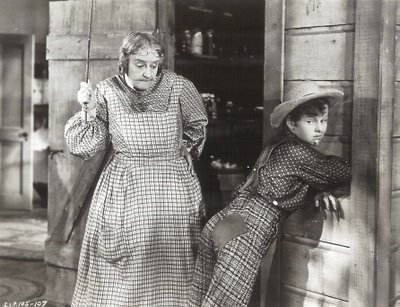
Grim across the board are virtually all of adult authority figures that surround Tom. Played in large by a cast born in the nineteenth century, they come across like characters from that time, quick with a hickory rod or a thimble thump to the head, cold and humorless otherwise. All seem rigid and repressed. Are these small-town denizens out of Mark Twain, or do they more reflect a grown-up culture Selznick knew in boyhood days? Tom is routinely beaten, and little of that is sugarcoated or played for laughs. Selznick does not sidestep cruelties visited upon children of this recreated time. Injun Joe may be a most frightening villain in all 30’s film, a nightmarish visage tempered not a whit by conscience or humanity. His pursuit of Tom and Becky in the cave is the equal of any horror sequence I’ve come across. Many of settings (designed by William Cameron Menzies) are creepy in the extreme. His graveyard, caverns, austere schoolroom --- all cast a baleful shadow and go a long way toward maintaining tension. Humor in The Adventures Of Tom Sawyer is all the more effective as a counterbalance to the suspense.
Part Two on The Adventures Of Tom Sawyer is HERE.
3 Comments:
John, you jogged my memory....back in the 1980s, I had a 35mm IB Technicolor Safety Film print of that picture....too bad I didn't hold on to it.....
EC
Perhaps MGM (current homevid licensor of the Selznick and ABC libraries) will soon finally release this; the company is stepping up its release sked because of its new distribution deal with Fox.
While I concur with your observation re the mostly wretched 1973 Readers' Digest musical adaptation of SAWYER, I would respectfully point out that Warren Oates is pretty good as Muff Potter in the picture.
"Does anyone else share my longstanding affection for this show?" you ask. Good heavens, doesn't everyone share it? If not, it's only because they haven't seen it.
I first saw this one on its 1958 reissue (on the bottom half of a double bill with The Lady Takes a Flyer with Lana Turner and Jeff Chandler; go figure). My dad, with fond memories of seeing it twenty years earlier in his own childhood, took our whole family to see it. My four-year-old brother insisted on a bag of M&Ms from the snack bar, and my dad bought him one just to keep him quiet during the movie. As the lights went down, my brother opened the bag and took out one M&M, pausing to glance at the screen before popping it in his mouth. He sat transfixed for the entire length of the movie, and as the lights came up at the end he sat there, that first M&M still poised in his left hand. (Needless to say, it hadn't melted.)
And yes indeed, how about that Victor Jory -- one of the great movie villains of all time. I'll never forget the look on his face as he climbs the cave wall toward Tom. That night, in my top bunkbed at home, I couldn't sleep -- I was certain I could see Injun Joe's face in the moonlit shadow from our backyard walnut tree across the wall beside me.
You've also jogged my memory, John, by publishing what I believe is the first picture on your site that I've ever seen before. The poster display at the Vogue Theatre in Pittsburg (CA) included that still of Aunt Polly catching Tom (literally) red-handed in the jam closet. It's Tom's first appearance in the book, and I wondered even then why they would have a picture of a scene that wasn't in the movie. My dad pointed at the poster for The Lady Takes a Flyer with Lana and Jeff in a clinch: "You didn't see that in the movie, did you?"
I've shown my own print of TAOTS to kids, as has my uncle Conrad to generations of my aunt's grade-school students, and the movie hasn't dated one bit, thanks largely to that 19th-century authenticity you so aptly cite (why, the San Fernando Valley set even looks like Hannibal, MO). Much credit goes, too, to Tommy Kelly. He later showed himself to be not much of an actor, but he simply is Tom Sawyer. Period.
Post a Comment
<< Home